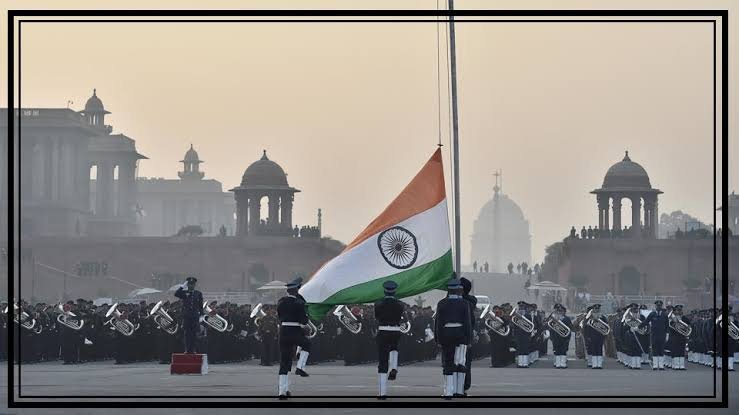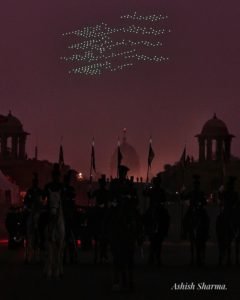For 72 years, the Secular Nation played a Christian Hymn at the Beating Retreat ceremony!


In his classic book on anti-colonialism ‘The Wretched of the Earth’ Franz Fanon concludes by saying, “Let us leave this Europe which never stops talking of man yet massacres him at every street corner, at every opportunity and at every corner of the world.”
For Fanon, the call was meant to reject the symbols of Europe that bound and chained the Native and which he described as created by the White man for his Empire and subjugation of the Native. He had in mind the world wars, the trans-atlantic slave trade and even the concentration camps and the holocaust.
Abide With Me, Fast Falls the Eventide, is the work of two authors. Henry Francis Lyte penned the poem Abide With Me in 1847 and set it to music three weeks before his demise. The hymn is frequently sung to a tune written by William Henry Monk called Eventide. Lyte was an Anglican minister and the son was sung (with his tune) for the first time at his funeral. Monk was a church organist who authored music for many other hymns and anthems.
Abide with me
About : Religion
What’s the meaning of the phrase ‘Abide with me’?
The name of the well-known Christian hymn, written by Henry Francis Lyte in 1847. A plea for God to be always present, in one’s life and through death.
What’s the origin of the phrase ‘Abide with me’?
The first verse of Abide with Me is traditionally sung at the English FA Cup Final (every year since 1927). It was also sung at the wedding of Queen Elizabeth II and at that of her father, George VI.
Abide With Me; fast falls the eventide;
The darkness deepens; Lord with me abide.
When other helpers fail and comforts flee,
Help of the helpless, O abide with me.
Swift to its close ebbs out life’s little day;
Earth’s joys grow dim; its glories pass away;
Change and decay in all around I see;
O Thou who changest not, abide with me.
Not a brief glance I beg, a passing word;
But as Thou dwell’st with Thy disciples, Lord,
Familiar, condescending, patient, free.
Come not to sojourn, but abide with me.
It was the same Europe that on one hand sang ‘Abide With Me’ when its Kings and Generals retired or in Churches and other occasions when they were having wars and mass murders exterminating people of color, seeing them as savages. Whether it was Jallianwalla Bagh or mass extermination in the concentration camps of Kenya, ‘Abide With Me’ was played on most occasions in giving farewells, eulogizing the King or the General saying that the good Lord stood by the White man in his responsibility towards controlling the savage.
‘Abide With Me’ was played at ceremonies by the same armies that legitimized mass massacres and slaughters for centuries, most of the victims numbering millions being dark Natives. How come then some label it as a romantic, beautiful and spiritual piece that uplifts the soul? How would General Michael Dwyer have felt hearing it if it was indeed played at his farewell from India?
When Fannon talked of ‘colonialism leaving the empire’ he talked of throwing away, destroying the symbols putting these symbols in their place, ones that bound former slaves to their masters. Why did the Indians held on to these symbols and continue to do so till today? How is it that the former colonial subjects of the Empire continue to see such practices as inseparable, pervasive and one that permeates the very breath of the nation without rejecting it?
In fighting slavery, there has to be an anti-colonial philosophy of relinquishment when subjects carry out their struggle against their colonial masters. The struggle for freedom must be combined with creating a national culture and consciousness of disavowal of the slave owner, failing which the colonialism perpetuates itself in another form long after the master is gone. We in India missed this transformation so our national psyche remains the same as it was a hundred years ago. I wonder why is it that our Father of the nation who wore home spun clothes and sang bhajans, got enamored with a Christian hymn that foisted a God, a religion as superior and exclusive over our faith? Isn’t it the faith that carried unmitigated violence in its name on our people and felt that God was on the side of the White man?
So, why couldn’t the two most important leaders of independence see the wounded civilization that was India? Why did they not vow to build a culture committed to relinquishment of the colonial one, a disavowal and refusal of an alien subjugating one and its various symbols necessary for an anti-imperial consciousness for an independent people? As a result, what we have left today is a fragmented identity where we continue to be ashamed of our national symbols and our roots whether in the form of playing of Christian hymns or going to memorials that do not commemorate our fallen dead? Can we as a nation ever claim that this kind of thinking has created an uncertainty as to where we stand as people and whether we are truly liberated from colonial subjugation?
The last stage in the anti-colonial struggle was to quit, stop and then leave. It was an act done as the last act of desperation by every other revolutionary who saw it as his last attempt at freedom. It was an act that heralded an end without being an end, one that brought in the death knell for the colonialist. It was also the most impossible of all steps done by the revolutionary, one that was done by a Subhash Chandra Bose or a Bhagat Singh who knew death existed at every corner for them and they may have to leave anytime. Those who didn’t choose this path that is choose to quit and die as an option called it nonviolence.
Ambedkar had once prophesied that the colonial regime of British would not suffer any atrophy in the shift from Viceroy Lord Mountbatten to Prime Minister Nehru. If he were alive today, he would have made the same remark seeing how little we have moved on from there.
It is said that for any country that has been enslaved, the colonial world outlives the colonizer long after he has left the country. In India, the hope of a social, egalitarian system that will liberate us when colonialism left this land died long ago. The belief that we might achieve it one day had receded so far that it didn’t seem to be have any more promise for its possibility. That is why on this Republic Day, the destruction of the symbols of colonialism holds on a promise that it may undo an injustice that had become a part of us. As Albert Memmi famously said that the progress for a freed nation begins with new symbols that they do by relinquishing the old.
So what will the Indian of the future, say one after fifty years from now see in the statue of Subhash Chandra Bose under the canopy at India Gate, or the eternal flame shifted to a War Memorial made for soldiers who fought for us? What will he learn as to why ‘Abide With Me’ was discontinued after seventy years of being played without being questioned once? Will he see them as a slave nation finally relinquishing its past and erasing the last of the symbols that chained him?
For our revolutionaries who kissed the rope before being hanged to death, the anti-colonial struggle was sustained through fleeting moments of egalitarian fantasies, a utopia. It was an unknowable world, an unguaranteed future that a new nation and its people will build, not carry on the dead relics from a colonial past and best relegated to the dustbin of history. For every symbol of colonialism that we continue to use and refuse to question and shake off, are we not desecrating that sacred memory of their sacrifice?
The British never stopped placing their culture in opposition to our culture. From Macaulay who said that the entire Indian civilization will not fill more than one rack in the British library, to Churchill, to every Viceroy who carried out atrocities, everything about the Indian was inferior, slow. The Indian was one whose art, whose music and culture didn’t deserve to be on the same pedestal and it goes without saying at whose farewell ‘Abide With Me’ was sung to let him know he was doing the duty of a White man. The emotional aura of the song, can it be ever separated from the way the British practiced their race and religion?
The independence that Indians got in 1947 could not be equated with the cessation or stopping of colonialism from the minds of people. Colonialism didn’t stop in India in 1947, it only changed faces because the new leaders after independence only slurped every lesson from their colonial masters. Is that why Gandhi liked ‘Abide With Me’ and Nehru is supposed to have said ‘he is an Englishman by education and Hindu by accident’. Didn’t we need people who were more authentic and true to their culture, roots and civilization? Only history can answer.
Jean Paul Sartre once famously said that only the colonizer is thought as qualified to speak on the colony through his writings, his poetry and his hymns. That he alone is the one who keeps a scoreboard over how the consciousness of the people enslaved remains the same or changes with the passage of time. The British when they left made it sure that they continue to rule over the minds of Indians as long as Indians do not begin to start questioning. For this they even prepared a group of Indians who will prevent such questioning. It is time Indians decide who will choose to express and speak for them.
It has become imperative that India must unshackle itself from the clutches of a Gandhi/Nehru ideology that was cleverly manufactured to impress upon a generation that had no direct relation/contact with either of them except for in the books..!! India was more colonized by a historical mindset told by these men through their appointed left historians. It’s time to shed the Gandhi India manufactured in our minds and look at the New India that is fast emerging here and globally. In this new India hypocritical characters who contributed to colonial deceit and minority appeasement had no place. The beating retreat that Gandhi supposedly liked is being removed as one among the many measures to unshackle itself from is manufactured past.
The Defence Ministry has dropped Abide with Me, a traditional Christian hymn that is believed to have been a favourite of Mahatma Gandhi, from the list of tunes for this year’s Beating the Retreat ceremony.
Tell me, why should a “Christian hymn” remain in practice irrespective of whether it was favourite of Mahatma Gandhi or not? It’s high time to get out of the British legacy and have something of our own. Doesn’t India deserve to have something of its own?
God will be there with them all the time whether they play this hymn or not.

DISCLAIMER: The author is solely responsible for the views expressed in this article. The author carries the responsibility for citing and/or licensing of images utilized within the text.
